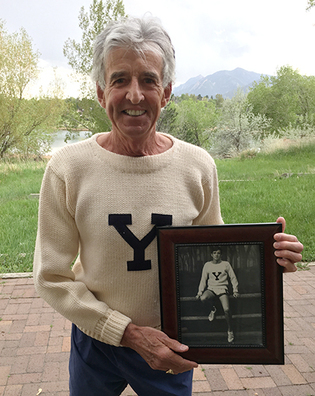 loading
loading
Where They Are NowStill in the runningCatching up with Olympic marathoner Frank Shorter ’69.  Courtesy Frank ShorterFrank Shorter ’69 inspired the jogging culture in America when he won the 1972 Olympic marathon. He is the last US male athlete to date to win the gold in that event, and the only American runner to win two Olympic marathon medals. View full imageThere is a famous image of Frank Shorter ’69, arms raised in triumph, eyes closed in bliss, just after he won the 1972 Olympic marathon in Munich. In another image, taken after the marathon four years later in Montreal, he is grimly congratulating gold medalist Waldemar Cierpinski—a runner with no previous record in marathons who, like many of his teammates in that era, was widely suspected of using performance-enhancing drugs. Now almost 70, Shorter is an attorney who campaigns against doping. He also works with a national organization that teaches kids how to use physical fitness to combat their own demons, as Shorter himself did as the child of an abusive father. And he’s the author of a recent memoir, My Marathon: Reflections on a Gold Medal Life. In between his twice-daily workouts, Shorter talked about the past and the present. Y: Why did you start to run? S: Back then, it was a pretty odd thing to do. Athletes ran cross country or on tracks, not on the street. But even as an 11-year-old, I discovered that I liked running, for itself and for stress relief. I also soon realized that I could run to get away from my dad’s abuse—he wasn’t much of an athlete so I knew he couldn’t catch me. Y: The frequent beatings you recount in your memoir, which your father Sam inflicted at random on you and your brothers and sisters, were harrowing. How did running help you cope? S: Every dedicated athlete learns how to compartmentalize, and, starting with my mother, who had an instinct for trying to protect her children, I’ve been able to hone that necessary skill. At Yale, I found a superb teacher in track coach Bob Giegengack, who’d coached the 1964 Olympic team and whose genius was that he allowed us to be flexible and find our own paths. I also found mentors in my friends, all of whom probably didn’t even know they were mentors. Y: You became a national collegiate running champion, but at much shorter distances than a marathon. How did you get the nerve to try that 26.2-mile race? S: I’d been self-coached since I was a junior, and one thing I learned from my friends was the courage to just give something a try. In the summer of 1968, when I was in New Mexico where my family then lived, I entered a marathon on a whim. Y: You eventually became great at it. Were you surprised that you won gold in Munich in 1972? S: I wasn’t in it to be surprised. As an undergraduate, I was always well prepared and got things done early—I never pulled an all-nighter and even finished my senior paper by spring break. And at Yale I had developed some unique distance training methods that involved both speed work and putting in lots of mileage, and when I dropped out of med school to go down to Florida to work out with some of the best runners in the country, I put my ideas into practice. This is just my personality, but winning an Olympic medal, or any medal, wasn’t the point. My goal was simply to see how good I could get. Y: In 1976 in Montreal, you were back, but you unexpectedly finished second to an East German whose name was later found in a dossier of athletes participating in a state-sponsored doping program. A quarter of a century later, with Barry McCaffrey, you helped create the US Anti-Doping Agency, a model for ridding sport of performance-enhancing drugs—and yet the problem continues. S: I’m a marathoner, so I’m by nature patient. If and when the people at the top truly want this to stop, it will happen. Y: Or is the better approach to cure it from the bottom up? S: That’s what I’m trying to do through my work with Healthy Learning Paths, which is showing kids how to use healthy habits like good diet and exercise to better their social and emotional health and their resiliency—to run toward a solution and not just away from a problem.
The comment period has expired.
|
|